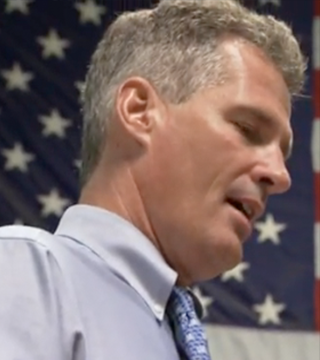Massachusetts Senators Are Among the Most Partisan and Unwilling to Work Across Aisle
Sunday, December 20, 2015

US Senator Elizabeth Warren (D-MA)
Both Warren and Markey are more partisan than GOP Senate Leader Mitch McConnell and GOP Presidential Candidates Rick Santorum or Lindsey Graham.
Markey is in fact among the most partisan to serve in the United States Senate in the past 22 years.
Of the 227 who have served in the Senate, Markey ranks 211th — which puts Markey one position ahead of former NC Republican Senator Jesse Helms as being least likely to work with those across the aisle.
Americans Approval of Congress
"Americans' approval of Congress averaged 16% in 2015, just slightly better than the 14% average recorded in 2013, the lowest in Gallup's four-decade trend. This marks the sixth consecutive year, and the seventh in the last eight years, in which fewer than 20% of Americans approved of Congress," according to Gallup.

The late US Senator Ted Kennedy (D-MA)
Senators Brown and Kennedy Least Partisan in MA
During this 22 year period, Massachusetts has had five Senators. The most willing to work with the other party was moderate Republican Scott Brown ranked 42nd and the second most likely was the late Senator Ted Kennedy ranked 119th.
Kennedy is followed by John Kerry at 136th, Warren 146th and Markey 211st for bipartisanship.
In contrast, Rhode Island Senator Lincoln Chafee was the overall least partisan of the 227 Senators who served. Chafee, of course, switched to being an Independent when he ran for Governor in 2010 and became a Democrat and ran for President in 2015 -- Chafee ranked number one for bipartisanship.
The most partisan according to the Index is former U.S. Jim DeMint of South Carolina who came in at #227.

Former US Senator Scott Brown (R-MA)
The Bipartisan Index is intended to fill a hole in the information available to the public about the performance of members of Congress. There are innumerable studies, rankings, and indexes that grade members according to a partisan, parochial, or special-interest standards.
Related Slideshow: MA’s Biggest Political Comebacks in History
Related Articles
- Warren Applauds FHA Loan Modifications As Helping MA Homeowners
- NEW: Warren Calls to Halt Rise of Student Loan Interest Rates
- Elizabeth Warren Lays Out Housing Finance Reform Priorities
- NEW: Warren Tolman Announces Campaign For MA Attorney General
- Arthur Schaper: Progressive Elizabeth Warren For President?
- NEW: Senator Warren Receiving Support for Bank On Students Act
- Warren’s Job Approval Rating in Central Mass Only 32 Percent
- Rene Grasso: Scott Brown, The Making of the Great Impostor
- GoLocalTV Thursday, September 6, 2012: Scott Brown Responds to Warren’s Speech
- New England Sports Stars Endorse Scott Brown
- NEW: Why Anna Maria College Withdrew Commencement Invitation to Vicki Kennedy
- Tape Art Takes Over Kennedy Plaza
- NEW: Kennedy on CNN Calls Mental Illness ‘Greatest Discrimination’
- Storytellers Draw Families to Kennedy Plaza
- NEW: Patrick Kennedy Opposed to Legalization of Marijuana
- Tom Finneran: Nixon/Kennedy, Two Thank Yous
- Central MA Up + Comer: Paint NIte’s April Kennedy
- Rob Horowitz: Kennedy: A Vision of What We Can Do Together
- Cheat Sheet 12, FBI Files: Patriarca and Robert Kennedy, $1M Suit Against Projo
- Mathew Helman: Scott Brown’s Misleading Rhetoric and Actual Record
- Rene Grasso: Friends Don’t Let Friends Vote for Scott Brown
- GoLocal Poll: Who is running a better campaign: Scott Brown or Elizabeth Warren
- How Pro-Choice is Scott Brown?
- Guest MINDSETTER™ Angela Davis: Scott Brown is the Candidate that Really Stands for Women
- Mass Dems Slam Scott Brown for Tax Plan Vote
- NEW: Scott Brown Calls for Bipartisan Effort to Restore Economy
- NEW: Councilor Lukes Featured in Scott Brown Ad
- SUPER POLL: Scott Brown v Elizabeth Warren
- By Blocking Susan Rice, is the GOP Paving the Way for Scott Brown?
- Paul Giorgio: Scott Brown: Desperately Seeking Relevance
- Paul Giorgio: Scott Brown is Sarah Palin in a Suit
- Scott Brown Finds Buyer for MA Home, Fueling Rumors of Run in NH
- Paul Giorgio: Scott Brown: To Be or Not to Be
- Paul Giorgio: For Scott Brown, it’s Strike Three
- Poll Shows Scott Brown Viewed “Favorably” For 2014 Gov. Run
- NEW: Scott Brown Joins Nixon Peabody Law Firm in Boston
- Scott Brown Leads All Senators in Donations from the Gun Lobby
- Scott Brown MIA But Still Polling Strong For Senate
- NEW: Scott Brown Will Not Run For Senate
- Paul Giorgio: Mitt Romney & Scott Brown Have Crossed the Border
- Elizabeth Warren Buys $740,000 DC Condo
- Warren Grills Bernanke at Senate Banking Committee Hearing
- MassFiscal Says Warren’s Minimum Wage Increase “Flawed”
- Warren Speaks on Senate Floor About Boston Marathon Bombings
- NEW: Former Mass Dem. Party Chair Endorses Warren Tolman for AG
- Paul Giorgio: Elizabeth Warren is Right on Student Loans
- Elizabeth Warren To Education Dept: Stop Profiting Off Student Loans
- Monfredo: Senator Warren Impressed by Worcester Technical High School Students
- Senator Warren to Visit Alabama for 50th Anniversary of Civil Rights Marches
- Senator Warren Releases Report on Labor Standards Failures
- Can a Biden-Warren Ticket Win in Massachusetts?
- Warren And Warner Call for Action on Housing Finance Infrastructure
- Guest MINDSETTER™ Warren Tolman: Candidate for Attorney General
- Warren Tolman Unveils Criminal Justice Policy For Massachusetts
- Warren’s Student Loan Refinancing Bill Lacks Republican Support
- Rob Horowitz: Obama and Warren: Making Strides on Student Loans
- Should Elizabeth Warren Run for President in 2016?
- Washington Post Gives Elizabeth Warren a Pinocchio Award of 2015
















Follow us on Pinterest Google + Facebook Twitter See It Read It